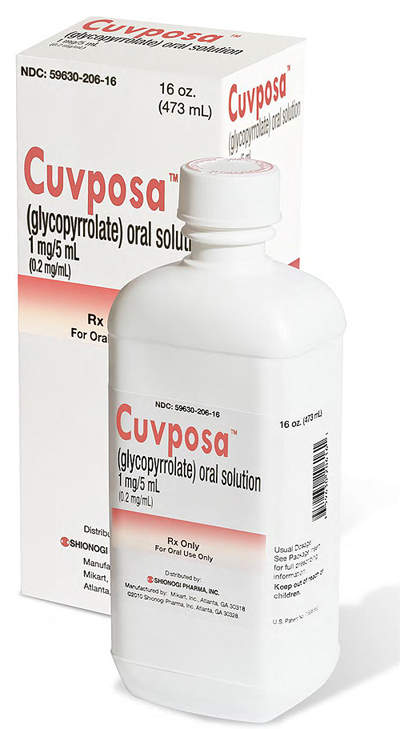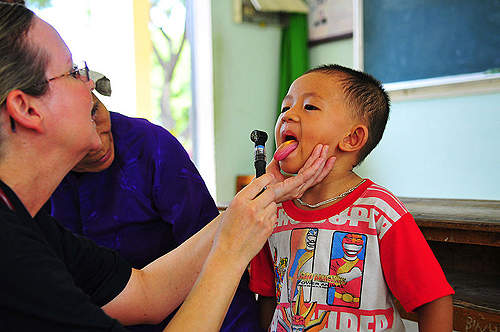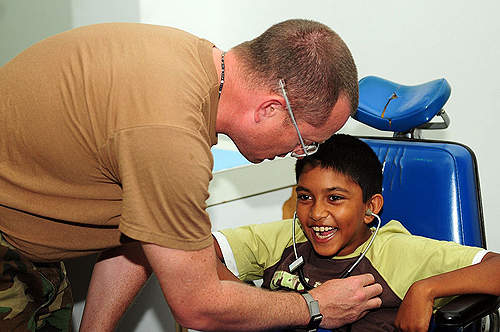Cuvposa (Glycopyrrolate) is the first and only approved drug for controlling drooling in patients aged between three and 16 years of age. The drug was developed by Sciele Pharma, a Shionogi group company.
Shionogi submitted a New Drug Application (NDA) for Cuvposa to the US Food and Drug Administration (FDA) in September 2009.
In July 2010, Shionogi received approval from the FDA for Cuvposa to treat chronic drooling patients with neurological conditions such as cerebral palsy. The current indication is for three to 16-year-old patients. Cuvposa was granted orphan drug designation status for a 1mg / 5ml oral solution in June 2006.
The results of phase III clinical trials on Cuvposa, announced in July 2010, showed that patients treated with the drug experienced a 75% improvement when compared with 11% in patients who were administered a placebo.
Drooling
Drooling is a condition in which the surplus production of saliva comes out of mouth. It causes problems in swallowing food and liquids, as well as retaining the excess saliva in mouth. The condition also leads to skin irritation and other health problems.
Drooling is found to affect about 10 to 30% of paediatric patients suffering from neurologic disorders. According to a study conducted in the US, the prevalence of cerebral palsy is found in 0.2% of drooling patents aged between three and 17 years.
Cuvposa Mechanism of Action
Cuvposa is an inhibitor of acetylcholine receptors. Acetylcholine is a neurotransmitter chemical. Its receptors are located in salivary glands and peripheral tissues. The stimulation of these receptors causes increased rate of salivation.
Cuvposa controls drooling by suppressing the action of these acetylcholine receptors.
The drug can be administered to patients through accurate measuring devices and caregivers only.
Cuvposa clinical trials
Shionogi completed phase II / III clinical trials on Cuvposa in February 2008. The double-blind, randomised and placebo-controlled trial enrolled 40 patients aged between three and 16 years in six centres across the US. The primary outcome measure of the study was measuring the severity and frequency of drooling.
The secondary outcome measures included assessment of the respondents who were treated with Cuvposa and placebo, evaluation of the patients who were dropped out of treatment during the clinical study, and assessment of the drug’s safety through clinical laboratory tests and physical examinations.
The company conducted phase III clinical trials on Cuvposa between March 2007 and June 2008. The six-month, open label and multicentre study was initiated to assess the safety and efficacy of Cuvposa. The study enrolled 130 chronic and severe drooling patients aged between three and 18 years in the US.
In September 2008, the company announced the results of an open label clinical trial on Cuvposa. The results showed that administration of Cuvposa liquid was well tolerated by patients aged between three and 18 years. Based on the results of these clinical trials Shionogi submitted the NDA to the US FDA.
The FDA approval of Cuvposa in July 2010 was based on the results of a randomised, multicentre, placebo-controlled and double-blind parallel eight-week phase III clinical trial. The trial enrolled 38 patients aged between three and 23 who were diagnosed with cerebral palsy or other neurologic conditions associated with drooling.
Out of the 38 patients, 36 were aged between two and 16 years. The patients were administered either with 0.02mg per kilogram of Cuvoposa three times a day or a placebo.
The results of the study showed that patients who were administered with Cuvoposa experienced a 75% improvement after eight weeks of treatment. The patients who were administered with a placebo experienced an improvement of just 11%.
The common adverse reactions found during the clinical trials were vomiting, dry mouth, flushing, nasal congestion and constipation.
Marketing commentary
Cuvposa is the first liquid treatment medication approved by the FDA for treating drooling in children. The drug was commercially introduced in the US market in association with Diplomat Specialty Pharmacy in April 2011.
Diplomat Specialty Pharmacy delivers the drug to the patients after receiving the physician order.





